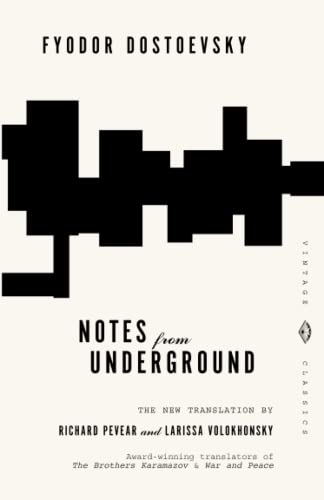In this exploration of Fyodor Dostoevsky’s novel “Notes from Underground”, we delve into the depths of the protagonist’s psyche, famously known as the Underground Man. This intricate character serves as a mirror, reflecting the complex and often contradictory aspects of human nature. From irrationality to self-awareness, and the eternal debate of free will vs determinism, the Underground Man showcases the paradoxes that define humanity. This exploration not only presents a vivid understanding of Dostoevsky’s protagonist but also opens a broader conversation about our inherent complexities as humans.
Notes from Underground
by Fyodor Dostoevsky (Author)
Richard Pevear (Translator), Larissa Volokhonsky (Translator)
Through the Underground Man’s self-scrutiny, Dostoevsky navigates the multifaceted realm of human nature. This journey uncovers profound and universal truths, illuminating our shared human experience in its raw, unfiltered complexity.
Irrationality:
The Underground Man frequently acts against his own interests, demonstrating that humans don’t always behave logically or rationally. This irrationality is a key part of human freedom and individuality. Unlike machines, people don’t always follow a predictable pattern or act in their own best interests. Sometimes, they choose to do things that don’t make sense to other
Example: Picture a woman who is allergic to cats yet decides to adopt a stray cat because she finds it adorable. She willingly endures sneezes and itches just to keep the cat, displaying a kind of irrationality that is borne out of emotional considerations, not logical ones.
Summary #1
Irrationality isn’t just a trait of Dostoevsky’s protagonist – it’s something we all exhibit in various aspects of our lives. It’s the unpredictability and emotional spontaneity that separates us from machines and makes us truly human.
Isolation and Alienation:
The Underground Man lives in self-imposed isolation, believing himself superior to the others. However, his solitude only intensifies his anguish. This reflects the human need for social connection and the negative impacts of social isolation.
Example: A professional athlete pushes himself to the brink of physical and mental exhaustion, relentlessly training to improve his performance. Despite his achievements, he’s never satisfied, constantly critiquing his performance and pushing for more, leading to a cycle of self-loathing and suffering.
Summary #2
The pain of isolation experienced by the Underground Man is a universal human experience. As social creatures, our mental health is intertwined with our connections to others, making this theme deeply relevant in our increasingly disconnected modern society.
Suffering and Self-Loathing:
The protagonist finds himself in a constant state of misery and self-hate. This could be seen as a commentary on how excessive self-awareness and introspection can lead to psychological distress. Yet, Dostoevsky also portrays this suffering as a form of existence affirmation. By suffering, the Underground Man confirms his sentient existence.
Example: Suppose you’re an artist who continually critiques your own work, always finding flaws. This self-awareness pushes you to improve but also becomes a source of torment. Yet, every brushstroke, every rework, every piece you discard reaffirms your existence and engagement with your craft.
Summary #3
Suffering and self-loathing are intrinsic to the human condition. Our self-critical tendencies can push us towards improvement but can also lead to emotional distress. Thus, understanding this paradox is essential for our wellbeing.
Consciousness and Self-Awareness:
The Underground Man believes that his heightened consciousness, which causes him to overthink and become paralyzed by indecision, is a curse. This illustrates how our unique ability to reflect on ourselves, our actions, and our place in the universe can both enrich and complicate our lives.
Example: An entrepreneur, faced with the decision to take a risky leap with her business, is paralyzed by her awareness of the possible outcomes. She spends sleepless nights considering every potential consequence, causing her to delay the decision. This demonstrates how heightened self-awareness can lead to indecisiveness.
Summary #4
The Underground Man’s paralysis by overthinking is something we’ve all experienced. In an age of information overload, finding a balance between reflection and action is crucial for our mental health and decision-making process.
Free Will vs Determinism:
The Underground Man debates whether humans have free will or if their actions are determined by their circumstances. He asserts his free will by choosing to act irrationally, arguing that unpredictability is a key part of human freedom. This brings up the idea of humans as autonomous beings with the power to make their own choices.
Example: Consider a child born into a family of musicians. Everyone expects the child to pursue music. However, He chooses to become a writer instead. This choice asserts his free will, even if it’s perceived as irrational or less promising.
Summary #5
The debate between free will and determinism is a fundamental question in human life. This theme is relevant as it influences our worldview, our ethics, and our perception of responsibility and agency.
Desire for Acknowledgment:
Despite his self-imposed isolation, the Underground Man craves recognition and understanding from others. This reflects the human desire to be seen and acknowledged, and the pain that can come from feeling invisible or misunderstood.
Example: Think of a person who consistently performs well at their job but receives no recognition from their superiors. Despite their competence and contributions, they feel overlooked, triggering a craving for acknowledgment and understanding.
Summary #6
The desire to be acknowledged and understood is a universal human longing. In a world that often feels impersonal and disconnected, this desire is more relevant than ever.
Desire for Meaning:
Despite his cynical outlook, the Underground Man yearns for purpose and emotional connection, suggesting an inherent human desire for life to have meaning beyond mere existence.
Example: A wealthy businessman has all the comforts one could wish for. However, he feels an emptiness within him because he hasn’t found a purpose or emotional connection that makes life more meaningful beyond his material possessions.
Summary #7
Our yearning for meaning beyond mere existence resonates with anyone seeking purpose in life. This is particularly relevant in today’s society, where people are increasingly seeking fulfillment and purpose beyond material wealth.
Resistance to Conformity:
The Underground Man resists societal norms and expectations, choosing instead to live according to his own principles. This highlights the human struggle between individuality and conformity, suggesting that while societal norms can provide a framework for behavior, they can also feel oppressive and limiting.
Example: A young woman grows up in a society where everyone is expected to marry young. Despite societal pressure, she chooses to focus on her career instead, valuing her individuality over societal norms.
Summary #8
The struggle between individuality and societal expectations is a recurring theme in our lives. Navigating this conflict is crucial in shaping our identity, making choices, and asserting our independence.
Empathy and Cruelty:
The Underground Man’s interaction with Liza, the prostitute, demonstrates the conflict between empathy and cruelty in human nature. He initially shows empathy towards Liza, but later cruelly rejects her. This suggests that humans have the capacity for both kindness and cruelty, often influenced by their own emotional state and circumstances.
Example: A man comes across a stray kitten. He initially shows kindness by feeding it, but later shooes it away cruelly when he’s stressed. This example suggests that human nature encompasses both empathy and cruelty, depending on circumstances and emotional states.
Summary #9
The tension between empathy and cruelty reflects the dual nature of our emotional capabilities. Understanding this helps us acknowledge our capacity for kindness and cruelty, making it a crucial part of emotional self-awareness and interpersonal relationships.
Final Thoughts
The Underground Man, through his erratic and often contradictory behaviors, illuminates the diverse facets of human nature, including the compelling need for individuality, recognition, and the desire for meaning. He exemplifies the struggle between empathy and cruelty, and the constant oscillation between social alienation and the yearning for connection. Ultimately, the exploration of these themes through the lens of Dostoevsky’s protagonist invites us to engage in a profound examination of our own humanity, reflecting on our individual and collective identities. As we grapple with the complex dimensions of our nature, let’s remember that, much like the Underground Man, we too are works in progress, endlessly evolving in our journey of understanding ourselves and the world around us.


